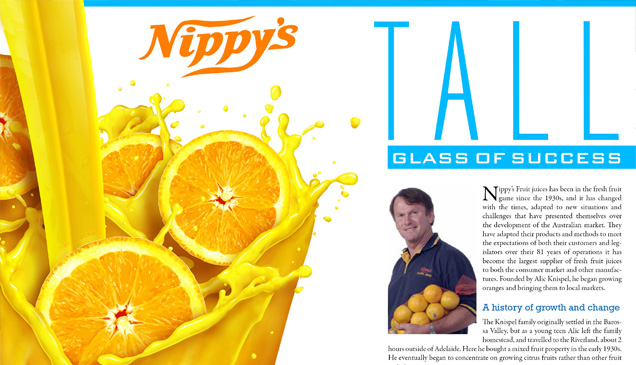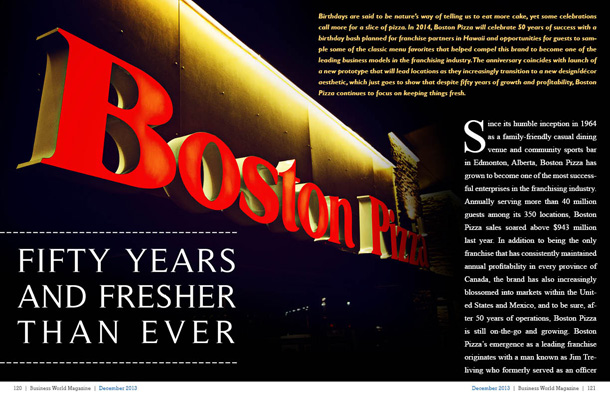
Tall Glass of Success
Nippy’s Fruit juices has been in the fresh fruit game since the 1930s, and it has changed with the times, adapted to new situations and challenges that have presented themselves over the development of the Australian market. They have adapted their products and methods to meet the expectations of both their customers and legislators over their 81 years of operations it has become the largest supplier of fresh fruit juices to both the consumer market and other manufactures. Founded by Alic Knispel, he began growing oranges and bringing them to local markets.
A history of growth and change
The Knispel family originally settled in the Barossa Valley, but as a young teen Alic left the family homestead, and travelled to the Riverland, about 2 hours outside of Adelaide. Here he bought a mixed fruit property in the early 1930s. He eventually began to concentrate on growing citrus fruits rather than other fruit varieties.
“The practice in those days was for the growers to supply all of their citrus crops to a community or cooperative packing house,” explains Jeff Knispel, son of Alic Knispel and Managing Director of Knispel Group of Companies. “He had the feeling that this way of doing things was not as efficient as it could be, he decided that not only would he grow his own oranges he would pack them as well.” This idea proved to be more successful than running it through a co-op. He entreated neighbouring growers to give him some of their crops to pack as well. From this, Alic was able to build a flowering business. “He was able to continue this success through several decades, throughout the Second World War and right on up until the 1960s. He was able to build up quite a strong business,” says Jeff Knispel. During this period, Alic was able to grow his citrus packing business with the help of other local growers. He also had great success by selling his crop into the Adelaide fruit and vegetable market.
This all changed when the South Australian Government, through community pressure decided to establish a Citrus Board with legislative powers to manage the citrus industry. Part of the Marketing Orders they established required packers to adhere to a certain set of rules and regulations, including establishing themselves outside of the metropolitan area.
“They introduced some legislation, and set up a citrus board to fix prices and license packers, growers and resellers,” this process introduced levies on each carton packed, and made the business less profitable and harder to break into than before. The intended outcome was to help both the citrus growers and the consumer but it had almost the opposite effect. Alic’s operation was halted by this; his business was located within a metropolitan area, which was not allowed by the Citrus Board. After two years the Knispel family opened a second packing house outside of the metropolitan area. “What we over-looked when we opened this new packing house was that we didn’t have anything like the shed door sales that we had when we were packing in the metro area,” says Jeff. This lead to them having a lot of surplus juice-quality oranges, and then they had an idea about what to do with them. “We had to develop a strategy to deal with this surplus,” says Jeff.
Alic’s sons, Robert and Jeff, would get up every morning at 4 am with their mother and make orange juice, first by hand and then with a small electric juicing machines. This they would sell to neighbours, friends and the local market. Soon their kitchen operation grew large enough that they had to rent a small factory with more sophisticated machinery to help them produce the quantities they needed. Three brothers took over the family business once their father retired. Jim, the oldest brother was killed in a road accident, and the twins, took on the responsibilities that he once had. The products they produced became known as Nippy’s, after a nickname the family got from their family name.
The Citrus Board now operates as a market research and licensing institution only now, it no longer tries to control the market due to its inability to do so in the past. Jeff Knipsel thinks this is a much more appropriate role for them.
Getting the mix right
“It took 10 or 15 years from that little kitchen start to make this the tail that wagged the dog. So now we have three operations,” says Jeff. “One is a chilled juice operation in Adelaide, the other is the fruit packing plant here in Waikerie, and we still have the original factory at Moorook facility but it now produces long-life products including juices, organic juices and flavoured dairy drinks, meal replacement products, and even powdered products.”
Jeff thinks that the success that Nippy’s has grown to enjoy stem from a few characteristics that have remained constant in their corporate structure: “A certain amount of common sense, a good work ethic, and realistic expectations of the market place,” Jeff lists. The last point he thinks is particularly important. They realized that all things take time- this attitude can be attributed to the long history and multiple roles that Nippy’s has played over the years.
Challenges in the market
“The issue of irrigation allocation to the horticultural industry is one of our current challenges,” says Jeff. It is a new challenge to the market. What horticulturalists choose to devote their fields to producing with their limited supply of water is a growing concern. “What will they do with their water allocation?” He asks. “Will they grow oranges? Will they grow almonds, or wine grapes – what will they do?”
“Our supply of citruses has become increasingly more threatened over the last decade and a half, and what set that ball in motion was that back in the late 80s and early 90s the wine-grape industry was particularly strong, and that gave growers a motive for getting out of citrus production.” This caused a trend towards more grape production and less citrus fruits to be grown, says Jeff. “This threatened out supply base,” he says. “We went from a buyer of citrus in a market that had, what was felt as, an oversupply of citrus to years were suppliers were about equal to demand.” Jeff says that if that trend had continued, demand would have soon outstripped that supply. They have addressed this issue by focusing on their suppliers and expanding their network. This may mean that they have to go abroad to get the fruits necessary to produce the quantities they need, but they still buy a large quantity of their juice quality fruits here at home.
Products
Nippy’s product range is substantial, each filing a market need and produced to a quality that they themselves hold in high esteem. Their Fresh Fruit Juices, Flavoured Dairy Drinks, and Fruit Flavoured Mineral Waters are available in a number of volumes and flavours. For their charitable work they have created a natural spring water product called, Nippy’s One4One.
Whenever they sell a bottle of One4One water, they donate a portion of that sale to Care Australia. Care Australia then reinvests their donation into water programmes in countries where clean drinking water is in short supply.
The book by its cover
By introducing Combibloc packaging- a flexible aluminium foil lined container – Nippy’s has been able to cut down on shipping costs, reduce waste that is produced in the packing process, and has found a product that does very well over seas – especially in Japan. “It’s the most efficient way of shipping juice, ready to drink from Australia to the rest of the world. In space and weight, it is very fuel efficient as compared to a bottle,” he says. Though they may not have gotten into Combibloc packing with the environment as the main focus, Jeff is very happy that it has had this side effect of lowering waste and increasing the fuel savings the containers represent. They have also responded to the organic and locally grown movements by developing their 100% Australian range of products. Here Nippy’s gives customers the choice of organics, though Jeff does acknowledge that this product range is a very niche market.
Paying attention to the needs of Australians
His real focus has been to provide everyday Australians with good, nutritional juice products at a reasonable cost. With the current economic climate, he thinks that it is the most important feature of what their products stand for. Nippy’s, through its history has weathered difficult times before, and Jeff thinks it is important that they support families by providing them with quality juices without stressing their wallets. The organic market is something they are looking to develop, but they are for now, focusing on providing Australian with what they need. “I can’t think of another Australian family owned company that is distributing orange juice nationally,” says Jeff, and they plan on continuing this family business with a new generation, and delivering the quality they have become known for to the new generation of shoppers.








